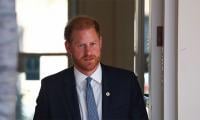WUHAN, China: British Prime Minister Boris Johnson battled the coronavirus in intensive care on Tuesday as his country and New York state recorded their highest number of deaths to date in the global pandemic.
The shocking hospitalisation of a major world leader has underscored the global reach of COVID-19, which has put more than four billion people -- over half of the planet -- on some form of lockdown, upended societies and battered economies worldwide.
Amid warnings that worse is yet to come, death tolls mounted in a crisis that has now claimed more than 75,500 lives out of 1.35 million confirmed cases around the world.
Britain reported 786 new deaths and New York state saw 731 in 24 hours, after Spain, France and Italy all recorded new surges in fatalities.
New research also showed Britain’s toll on a steeper trajectory than other nations and predicted as many as 66,000 deaths there by July, far more than in hard-hit Italy, which has the highest fatalities to date.
Johnson, 55, was himself moved into intensive care when his condition worsened 10 days after his diagnosis. His spokesman said he was stable overnight and "remains in good spirits". But there were glimmers of hope in the daily diet of deadly statistics.
Spain said its downward trend in new infections and deaths was continuing and that increases in fatalities on Monday and Tuesday were the result of weekend deaths being tallied. Eduardo Fernandez, a 39-year-old nurse at Madrid’s Infanta Sofia Hospital, said there had been fewer admissions in recent days.
"But we remain much above our usual capacity," he cautioned. "I don’t know if my colleagues who are in the eye of the storm are able to see (the decrease) because the work pressure is very high."
Iran’s parliament convened for the first time since late February as the country reported a drop in new infections for the seventh straight day. And in China on Tuesday there were no new deaths reported for the first time.
At midnight, a two-month travel ban was lifted in Wuhan, where the virus first emerged late last year, prompting thousands to flock to train stations to leave to city.
"Now that the lockdown has been lifted, I think we’re all pretty happy," said a 21-year-old man surnamed Yao, who was heading back to his restaurant job in Shanghai.
China and other Asian nations have raised alarm over a possible second wave of infections, and Beijing has only started gradually easing restrictions in former epicentre Wuhan in recent weeks.
Meanwhile, New York Governor Andrew Cuomo said the state appeared be nearing the peak of its pandemic, with a three-day average of hospitalisations down.
Intensive care admissions and intubations had also declined. "We’re projecting that we’re reaching a plateau in the number of hospitalisations," Cuomo told reporters.
He said social distancing was working, urging New Yorkers to continue to stay indoors unless absolutely necessary. "I know it’s hard but we have to keep doing it," Cuomo said.
The virus is stretching medical facilities to the limit and the World Health Organisation warned there was a global shortage of six million nurses.
People around the world have been forced to improvise as supplies run short, with bodies packed in cardboard coffins in Ecuador and a mosque converted into a makeshift mask factory in Iran.
Undertakers in New York are so overworked that a city official raised the possibility of carrying out temporary burials in a public park. "Trenches will be dug for 10 caskets in a line. It will be done in a dignified, orderly and temporary manner," tweeted Mark Levine.
New York City funeral home director Pat Marmo said he was dealing with three times more bodies than normal. "It’s almost like 9/11, going on for days and days and days," he said.
Governments around the world are scrambling to put together rescue packages to stem the economic damage from effectively shutting down global commerce, as fears loom of a devastating recession.
The UN’s International Labour Organisation said 81 percent of the global workforce of 3.3 billion people are now affected by "the worst global crisis since the Second World War".
Japan, which declared a month-long state of emergency on Tuesday, has promised a $1-trillion stimulus package, a staggering 20 percent of GDP in the world’s third-largest economy. With the ink barely dry on a $2-trillion economic rescue package passed by Congress, US President Donald Trump said he favoured another massive spending programme, worth another roughly $2 trillion, but this time targeting infrastructure projects.
"We built the greatest economy in the world. I’ll do it a second time," he said. EU finance ministers could clinch a deal to use the eurozone’s 410-billion-euro ($447 billion) bailout fund to fight the virus but the bloc remains divided on pooling debt to issue "coronabonds".
Mario Centeno, the head of the Eurogroup of eurozone finance ministers, urged them to agree to a "bold response" and "sizeable recovery plan".
Stock markets have chosen to see the glass as half-full, seizing on some signs of a slowdown in the spread of the coronavirus. Wall Street stocks surged for a second straight day on Tuesday and markets were up across Asia and Europe.
The EU announced it would put up 15 billion euros to help developing countries around the world fight the epidemic, which is only starting to spread in some of the world’s poorest countries.
Miles away from high-level meetings, at a refugee camp outside Mali’s capital Bamako, people displaced by war and jihadist insurgencies were terrified of the virus reaching their makeshift homes. "If we have coronavirus here, it will be a catastrophe," said Hamadoun Boukary Barry, a white-bearded grandfather who fled central Mali with 23 family members to the camp.
Azerbaijan has been demanding the villages’ return as a precondition for a peace deal after more than three decades...
The Republican Party and the Trump campaign said in a statement that they plan to recruit an army of poll watchers
All three suffered some frostbite to their cheeks, despite wearing heated masks
Sunak sought to appeal to core Conservative voters by warning the current welfare bill was fiscally unsustainable
The inquiry published its report in 2010, finding that some soldiers had knowingly put forward false accounts
A few private schools in Dubai commenced a little later during online classes on Tuesday







